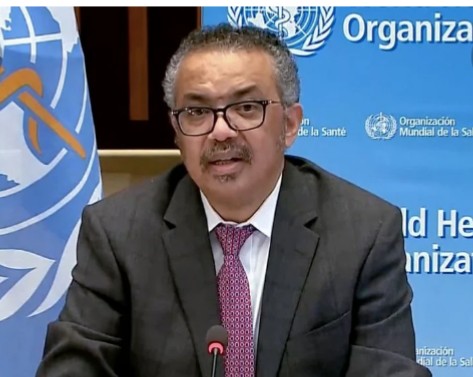|
Getting your Trinity Audio player ready…
|
By Joyce Mukucha
The World Health Organisation (WHO) chief Tedros Ghebreyesus said a “tsunami” of Omicron and Delta COVID-19 cases will increase pressure on health systems that are already on the edge of collapsing and again disrupting lives and livelihoods.
“The fast-moving omicron variant of COVID-19 is triggering a “tsunami of cases,” leaving health systems near collapse, exhausting health workers, and disrupting the goal of halting the pandemic’s acute phase in 2022,” he said.
He highlighted that the Delta and Omicron variants of concern were “twin threats” that were driving new case numbers to record highs, leading to spikes in hospitalisations and deaths.
New global cases, he said, had risen by 11 percent last week, while the United States and France both registered record daily case numbers on Wednesday.
“I am highly concerned that Omicron, being more transmissible, circulating at the same time as Delta, is leading to a tsunami of cases. This is and will continue to put immense pressure on exhausted health workers, and health systems on the brink of collapse.
“The pressure on health systems is not only because of new COVID-19 patients requiring hospitalisation but also a large number of health workers are getting sick themselves.”
The WHO chief said there were 1.8 million recorded deaths in 2020, and 3.5 million in 2021 highlighting that WHO knows that the actual number is much higher.
“This is not to mention to the millions of people dealing with long-term consequences from the virus.”
Ghebreyesus bemoaned populism, narrow nationalism and hoarding of health tools, including masks, therapeutics, diagnostics and vaccines, by a small number of countries indicating that it undermined equity, and created the ideal conditions for the emergence of new variants.
“Misinformation and disinformation, often spread by a small number of people, have been a constant distraction, undermining science and trust in lifesaving health tools.
“In the huge waves of cases currently seen in Europe and in many countries around the world, misinformation which has driven vaccine hesitancy is now translating to the unvaccinated disproportionally dying. This is the moment for leaders to banish the politics of populism and self-interest, which are derailing the COVID-19 response and threaten to undermine the response to the inevitable next disease X.”
He stressed that it was vitally important that the established Scientific Advisory Group for the Origins of Novel Pathogens can develop a pathway for the scientific research of pathogens, including for the origins of SARS-CoV-2.
“And we hope to see progress quickly in the New Year. I still remain optimistic that this can be the year we not only end the acute stage of the pandemic but we also chart a path to stronger health security.”
Building on the successes and failures, he said countries must not only share vaccines faster and more equitably with COVAX and AVAT but also render unwavering support to manufacturing nations.
“We must support countries in manufacturing and rolling them out to everyone. And access to new treatments must also follow. This virus will continue to evolve and threaten our health systems if we don’t improve the collective response.”
Omicron, WHO chief said, wass moving so quickly and he indicated that in addition to vaccination, public health social measures are also needed to stem the wave of infection, protect health workers and systems, open up societies and keep children in school.
Innovative solutions, he said, to reaching vulnerable communities that have not received vaccination yet because the primary doses are the most important for people to develop immunity are welcomed.
“Bottom-up microplanning with strong community engagement and mobile vaccination teams, which have been highly effective in ridding most of the world of polio, are another way to get vaccines to the hard-to-reach.”
The Director General said WHO will support countries as they look to improve access to COVID-19 tools and catch up with routine immunisation.
He also emphasised that mental health must also be treated as a core element of our response to and recovery from the COVID-19 pandemic.
While 2021 has been hard, the WHO chief called upon governments and everyone to make a New Year’s resolution to get behind the campaign to vaccinate 70% by the middle of 2022.
“I want governments, industry and civil society to work with us on a campaign that targets 70% vaccine coverage in every country by the start of July. We have 185 days to the finish line of achieving 70% by the start of July 2022. And the clock starts now! If we drive this campaign together, we’ll all be in a much better place by this time next year,” he reiterated.
Ending health inequity,he pointed out, remains the key to ending the pandemic.
“I also want to ensure COVID-19 care pathways with new treatments are available in every single country. And to ensure people get on treatment at the optimum time, we need to get tests everywhere.This is the time to rise above short-term nationalism and protect populations and economies against future variants by ending global vaccine inequity.
“In the year ahead, I call for leaders of government and industry to walk the talk on vaccine equity both by ensuring consistent supply and helping to get vaccinations actually into people.Vaccine supply, for now at least, is improving although the emphasis on boosters in rich countries could cause low-income countries to go short again.”
In 2022, it has been learnt, WHO will work with our Member States to build well-financed health systems, strengthen preparedness and ensure the equitable distribution of health tools.
